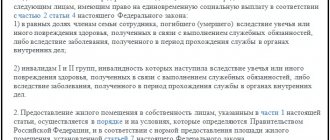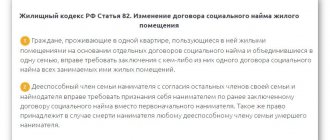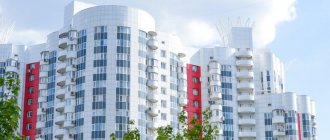What are the chances of getting paid?
In 2021, the city’s costs for social payments for the resettlement of KK will amount to 3,736 million rubles. Who will receive this money?
Firstly, only those persons who became participants in the Program:
- They live in KK by right of ownership or rent.
- Must be registered as in need of housing or improved living conditions.
- They expressed a desire to become participants in the KK resettlement program.
Secondly, priority is given to participants:
- Whose family includes more than three children under 18 years of age.
- Living in an MCC or in a CC included in the List (that is, all residents participate in resettlement on the basis of the Program).
Important! Starting from 2021, payments are available to residents of any residential complex, even those not included in the List.
Accommodation options
The issue of resettlement from communal apartments is resolved on the basis of the purchase of rooms by one person, receipt of social benefits or housing for those in need, and exchange of premises.
Read also: Law on Trade Unions
The resettlement option depends on the form of ownership of the residential premises:
- The apartment was received from state funds. City authorities maintain the square and improve conditions. That is, if a person had a wooden building, he has the right to housing in a panel or brick house.
- The state apartment meets the requirements for improvement, but does not meet the square footage per person. An improved layout of living space is provided.
- A citizen has ownership rights to real estate that is not included in the resettlement list. A payment is provided in accordance with the cost of housing on the market, after which the person submits a written application to the administration. He has the right to premises in a house on 5 or 9 floors. The amount received upon eviction will be part of the price of the new residential property.
On a note! After resettlement, the family must have housing with an equivalent area, location, degree of improvement and status.
What can social benefits be spent on?
Since the Program is targeted, it is clear that the money received can only be spent in a certain way.
You just need to choose what to do with them:
- Buy a separate house or apartment within the region.
- Buy the remaining rooms in your communal apartment (make it completely yours).
- Conclude an agreement on shared construction or buy it from the previous participant, provided that the house is 70% ready.
- Contribute as a share in a housing cooperative or housing cooperative (home readiness - 70%) for subsequent receipt of ownership of housing.
- Conclude an exchange agreement and pay the difference in the cost of the room and the housing received (available only for owners).
Members of the same family can combine payments received.
Note! Any chosen option must meet two requirements: housing is purchased within the region based on at least 10 sq.m. for each family member.
Payment upon repossession of your property
The state provides compensation for the resettlement of communal apartments in the form of:
- cash payment in the amount of the market value of the property;
- discounts for waiting your turn. If a citizen has not received housing within 15 years, he can purchase a room at 70% cheaper;
- subsidies. The payment is sufficient for the mortgage payment.
To calculate the amount of monetary compensation, multiply:
- housing standard for 1 person (in Moscow - 18 sq. m.);
- average price per square meter of residential real estate in the region;
- correction factor (0.3 for Moscow).
On a note! The cost per square meter for the second quarter of 2021 on Arbat was 339,491 rubles, in Chertanovo - 160,326 rubles.
The targeted renovation program is being implemented only in Moscow and St. Petersburg. Residents of other cities are responsible for resettlement on their own. If it is impossible to participate in the regional program, you can apply for a preferential mortgage. Getting your own home for free involves a long wait until it’s the turn of a particular family.
Requirements
The practice of implementing St. Petersburg Law No. 513-101 is disclosed in the St. Petersburg Government Decree No. 1537 dated December 4, 2007. It contains guarantees for family members living in the KK (paragraph 7 of clause 2.1).
Each member of a family being resettled from a communal apartment receives ownership of a new home. What does it mean? That the purchased housing belongs to them all equally.
If an additional mortgage is taken out, its recipient (usually one person) undertakes to re-register housing for all his relatives no later than six months after paying off the mortgage. He must draw up this document from a notary and submit it to the Residential Complex.
With the help of social payments you cannot change or buy housing in which you cannot live. After all, it is unlikely that the purchase of a premises without water, heating, sewerage or with cracks in the walls can be considered as an improvement in living conditions. Therefore, when choosing options, you need to look not only at the price, but also at the condition of the housing (safety, sanitary conditions, etc.). Especially when there are dependent children or disabled people. Because they are under enhanced state protection.
In addition, the money received will not be used for the purchase of mortgaged housing or housing encumbered by the rights of third parties (for example, rental rights).
Important! If the social payment is intended for residents of a communal apartment included in the List, then the intended use of the payment implies the occupancy of such an apartment by a single family.
“Pitfalls” when moving an apartment
Renovation is a government program that implements the resettlement of citizens from communal apartments. Tenants and owners who received real estate report a number of unforeseen circumstances:
- disrepair of the apartment. The housing complex does not define criteria for improvement, so people are allowed to move into houses on the secondary and primary market. The basis for the trial will be a list of criteria in accordance with Government Resolution No.
- provision of housing in another locality or area. The Housing Code establishes the obligation of the mayor's office to provide real estate on the territory under the management of the main unit;
- worse living conditions. This factor is unacceptable - deterioration is defined as moving from the first to the top floor or a house without a garbage chute.
Read also: What can be imported to Russia
Only residents of city balance buildings can challenge these points. The program for relocating communal apartments does not apply to private property.
Decree of the Government of the Russian Federation of January 28, 2006 N 47 “On approval of the Regulations on recognizing premises as residential premises, residential premises unsuitable for habitation, an apartment building in disrepair and subject to demolition or reconstruction, a garden house as a residential building and a residential building as a garden house”
Who handles the payments?
Residents of communal apartments, starting from 2021, resolve all issues regarding payments at the Housing Committee (LC), where applications are submitted and where lists of Program participants are maintained. This is where they will help you identify the necessary documents, accept and study them. Next, within a month, a decision is made whether to provide payment or refuse it. Residential Committee staff will inform applicants of the results of consideration of their candidacy.
If the decision is positive, a certificate of entitlement to receive social benefits is issued within 5 days. In this case, the recipient must use the money for the intended purpose within a year.
How does this happen? Having chosen the method of using city money, the recipient collects the necessary papers (agreements, certificates of the degree of readiness of the house, etc.) and submits them to the budgetary institution subordinate to the housing complex. Then the documents are received by the housing complex, studied and after 10 days a notification is sent about the acceptability of using the payment (that is, whether this is the intended use of the money or not).
Remember! The residential complex can extend the validity of the certificate if it proves that measures have been taken to use the payment, but the process is simply not completed.
Law on the resettlement of communal apartments
The resettlement of communal apartments is a government program aimed at improving the living conditions of citizens. This program also aims to eradicate communal apartments that have been preserved since Soviet times, regardless of their location. Simply put, resettlement is the removal of citizens from a public apartment and assistance to them in acquiring new residential premises in accordance with legal norms and requirements. The program has been extended until 2021.
The resettlement of communal apartments is carried out due to the recognition of the premises as dilapidated housing or suitable for demolition. And in their place it is planned to build new houses with improved conditions. The majority of citizens want to improve their living conditions through the program, while the state intends to improve the current situation with the help of demolished premises. However, resettlement of citizens against their will is only possible through legal proceedings.
Tenants or owners of communal apartments who are subject to resettlement under the program have the right to participate in the program. As well as people who are on the waiting list as people in need of housing.
How much can you get?
The calculation methodology was proposed by the Government of St. Petersburg:
Payment amount = N x C x A x 40 (%) where
| N | How much sq.m. total area (a single citizen is provided with 33 square meters, the rest - 18 square meters each) |
| WITH | How many family members are registered in the Program? |
| A | Average cost sq.m. in St. Petersburg, approved by the state (in the second quarter of 2021 this is 67,221 rubles) |
Consequently, a family of five living in a communal apartment will be offered 2,419,956 rubles as help to improve their living conditions (18x5x67221x40%).
Program participants have access to not only social benefits, but also other opportunities. You can get municipal housing for rent out of turn or a vacant room in your communal apartment. Decide for yourself what to use.
The video story will tell about the resettlement of communal apartments in St. Petersburg
Release of communal hostages
Quite recently, moving into a communal apartment without the consent of neighbors was impossible; now (since the spring of 2015) there is no need to look for the owner of the room and not seek his positive decision to include the apartment in the target program. But there is a certain privileged right to a place in the queue for participation in the program.
- Those program participants who have achieved the consent of all owners can be the first to receive funds from the budget.
- Next in priority are large families who want to leave an intractable neighbor.
- And only then can those who do not belong to this preferential category of citizens and have not been able to resolve the issue of resettlement with one of the responsible tenants hope for state support.
The subsidy can be issued to all those on the waiting list, despite the refusal of one of the neighbors to leave their home. The rest can simply get the money and go to separate apartments, while the problem tenant will remain and be “densified” with new socially hired migrants.
Law
There is no uniform law on the resettlement of communal apartments. Each situation requires an individual approach and follows certain standards. But it is worth considering that the laws of the Russian Federation are taken into account when resettling.
Resettlement can be used in any area of everyday life. For example, in a situation where parents are deprived of parental rights and there is a threat to the child’s health, resettlement or eviction is carried out forcibly. Often by order of the prosecutor in a criminal case, as well as with the participation of guardianship authorities.
The scale of the communal problem
Communal apartments in the familiar form are a relic of the Soviet era . Initially, they appeared as the Bolsheviks’ answer to the housing question - working-class families began to move into multi-room apartments (the so-called densification). This happened after private ownership of housing and land was abolished. Thus, the concept of a communal apartment is already about 100 years old, but they still exist in Russia.
Living in one apartment for several families at once brings many difficulties - a shared kitchen and other amenities, the possibility of conflict situations, and difficulties with selling such real estate.
Now communal apartments are a problem mainly in St. Petersburg and, to a lesser extent, in Moscow. In other cities, such housing is currently found in isolated cases.
Officially, the problem of communal apartments is raised only at the regional level, and a full-fledged program for their resettlement exists only in St. Petersburg.
It is worth distinguishing a communal apartment from an apartment in which several families simply live. In order for an apartment to become a communal apartment, the families’ shares must be allocated in kind, and each family must have its own personal account.
The problem of communal apartments in Russia remains large-scale, although no one keeps records of them at the state level. From various sources you can collect the following data on their quantity:
- in St. Petersburg as of 2021, there were 71.8 thousand communal apartments, and 233 thousand families live in them;
- in Moscow in 2014 there were 72 thousand communal apartments and 180 thousand families living in them;
- in other cities – statistics are not kept.
The problem of relocating communal apartments is usually solved in several ways:
- purchase of all rooms by one buyer;
- purchase by one tenant of the remaining rooms;
- social benefits for families in need of resettlement;
- providing housing to those in need in accordance with the law;
- exchange of rooms, etc.
Many communal apartments were resettled in the 90s - they were located mainly in the old building, which was of interest to realtors and their clients. In Moscow, only from 1991 to 1998, the number of communal apartments was halved - from 240 to 120 thousand.
After 2004, it became impossible to create new communal apartments - amendments to the Housing Code now prohibit the separation of personal accounts. And in Moscow, since 2006, city authorities have not been able to accommodate those in need of housing.
How to participate in the program?
To join the program, you must contact the district administration department, where a package of documents is accepted. After this, the administration considers the application for a specific person or family. And makes a decision - to put in a queue or reject the application. The final decision will be made by the head of the district where a particular communal apartment is located.
To participate in the program for the resettlement of communal apartments, it is important to submit the following documents, which are established by law:
- Document confirming the applicant's identity
- Certificate from the Unified State Register of Rights on the presence or absence of restrictions on living space
- Certificate of individual technical description of living space in form No. 7.
- Information certificate about persons registered in this premises according to form No. 9.
- Certificate in form No. 12, which indicates whether persons serving sentences in prison or serving in the army live in the apartment.
- Documents confirming the ownership of housing and explaining the emergence of this right. If the apartment is municipal, you must provide a social tenancy agreement.
- A cadastral passport for the premises, it contains information about the presence of illegal redevelopment or reconstruction.
- A confirmation certificate from the Homeowners Association confirming that there is no debt for utility bills.
- Agreement between neighbors to move into a communal apartment in writing.







